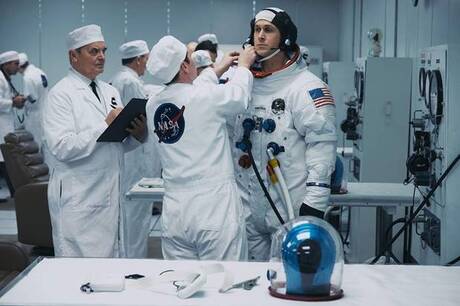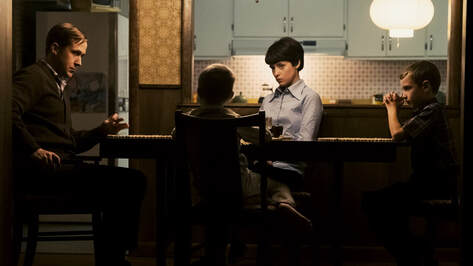A- | Neil Armstrong experiences personal and professional upheaval, leading up to his landing on the moon. Directed by Damien Chazelle Starring Ryan Gosling and Claire Foy Review by Jon Kissel |

That head spends a lot of time in the clouds, literally and not figuratively. First Man’s opening scene places the camera inside a test plane’s cockpit with Armstrong as he soars into the upper atmosphere. The sonic and visual effect is hardly the peaceful ballet of 2001’s Blue Danube. The plane, buffeted by G-forces, seems to not have a single fully-tightened screw based on the level of rattling and the rest of the soundscape is filled with Justin Hurwitz’s haunting and alien score. Quick cuts communicate stress, disorientation, and the very real possibility that the vehicle will crumble and plummet back to the surface. A moment of respite from the madness is achieved in a second’s long apogee of weightlessness and calm before the plane is hurtling back to earth. The first of many harrowing voyages over the film’s runtime, First Man deromanticizes and deflates experimental flight, turning it into a feat of brutalist engineering and nick-of-time problem solving made in the moments between consciousness and unconsciousness.
The specific kind of person navigating their way through this high-risk labyrinth is immediately recognizable as a stoic Midwesterner, and an engineer to boot. This combination of emotional blankness and technical competence is a winning recipe for Gosling, but the film follows its opening flight with a direct blow to that specific combination. The year 1962 signals the start of the final phase of the Space Race with JFK’s moon speech, and is therefore a logical time for First Man to begin, but for the Armstrong family, a more searing event sets the film in motion. Armstrong’s baby daughter Karen is afflicted with a brain tumor, and no amount of internal strength and rigorous problem-solving from Dad is able to save her. Armstrong takes this perceived failure as a doubling down, becoming more focused on his new mission at the expense of a fuller relationship with his wife Janet (Claire Foy) and two sons. First Man’s framing of the film between Karen’s illness and death and the eventual moon landing serves as both a refutation and an argument for this particular American archetype, simultaneously incapable of emotional honesty and capable of titanic accomplishments.

Even as Armstrong is internalizing his grief to the level that he experiences fleeting glimpses of Karen in the background, First Man is not all competence porn and a refusal to find romanticism in this grand pursuit. While the process of getting to the moon is jangling hardware and the occasional fiery explosion, that aforementioned nirvana above the clouds, floating over all of human past, present, and future, is communicated to be worth it. The purest case for space exploration is made by Armstrong at a press conference, in which he states that the endeavor changes one’s perspective, a necessary shift in a world perpetually on the edge of total annihilation. In a first for a Space Race film, however, Chazelle includes a compelling counterpoint in a montage scored to Gil Scott-Heron’s lacerating poem Whitey on the Moon. While it argues for resources spent surface-side, the poem doesn’t allow for the possibility of Armstrong’s statement, that the potential of seeing humanity’s vast insignificance amongst a sea of black universe might distill useless racial superiority into the obvious lie that it is.
It’s one thing for Armstrong to state the Space Race’s moral purpose, and it’s another to visually communicate it in a film that has otherwise gone out of its way to show both the banality and the human impact of NASA’s failures. In the shared neighborhood of Apollo astronauts, Armstrong bonds most with Elliot See (Patrick Fugit) and Ed White (Jason Clarke), and though the three of them share drinks around Lucite tables in each other’s homes, only Armstrong will survive the program, adding to his quotient of grief. The death of White, alongside Gus Grissom (Shea Whigham) and Roger Chafee (Cory Michael Smith) on the Apollo 1 launchpad, is sculpted with the tense precision of the 7/7 bombings in Zero Dark Thirty. Both are infamous disasters that lose nothing in knowing that they’re coming, and Chazelle ends the Apollo 1 sequence with a deflated crump of pressure that resonates months after seeing First Man.
Despite the human toll and despite the desolate surface of the moon itself, First Man still sells how important and monumental this was, at least to this viewer who was left a blubbering mess by the washed-out greys of the lunar landscape. First Man goes into clinical, sensory detail about the difficulty and unpleasantness of the space program, implying as much with every spooky note of Hurwitz’s score and every ominous frame of the launchpad made to look like it’s sending astronauts into some Lovecraftian abyss, but it still manages to operate as a deeply affecting success story.
Negative qualities leading to positive outcomes, or greatness powered by flaws, is a pet theme for Chazelle after Whiplash, a film that culminated in two people whose obsession made them terrible for everyone else but each other. The wealth of potential stories that adhere to this theme should keep Chazelle working for decades. First Man argues heavily for his position atop his peer group and beyond it. This is intelligent, wide-release filmmaking that, though it incomprehensibly failed to find great success, covers myriad scopes and perspectives in pursuit of finding out who Neil Armstrong was and why what he’s remembered for is worth remembering. First Man itself isn’t quite up to the level of putting a man on the moon, but it is still a singular achievement. A
 RSS Feed
RSS Feed